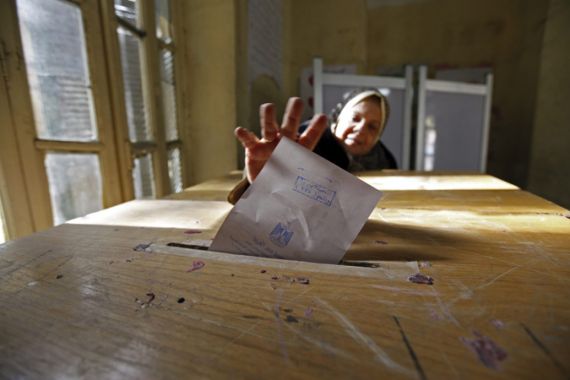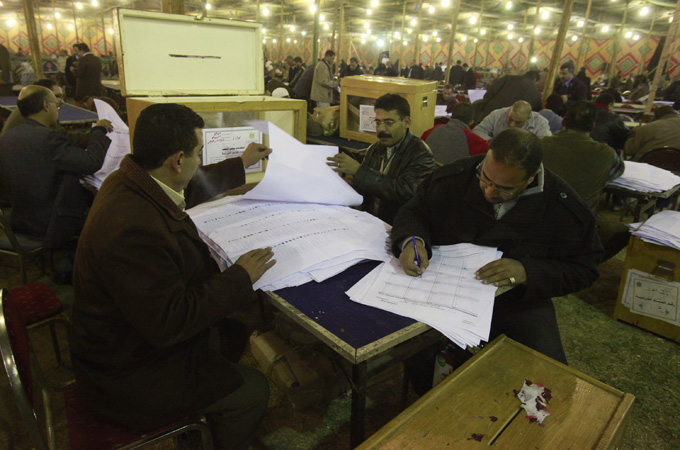NGO ‘crisis’ distracts from Egypt polls
Election fatigue and controversy over funding of civil society groups result in low-key interest in upper house vote.

 |
| Egyptians take to the polls in two phases to elect members for the Shura Council – lower house of parliament [Reuters] |
The second part of the election process to fill Egypt’s first post-uprising parliament begins on Sunday, but voter apathy and an escalating crackdown on US-funded civil society groups mean few may be paying attention.
Voting for the Shura Council, the less-powerful upper house of parliament, occurs in two stages, but voters and some political parties show little sign of interest in the polls, having just emerged from a marathon six-week, three-stage election for the lower house, or People’s Assembly.
The role of the Shura Council remains undefined – it may have mere symbolic authority – and one of the country’s most prominent new secular parties has officially withdrawn from the vote. Election monitors say that means Islamist groups, including the Muslim Brotherhood’s Freedom and Justice Party, are now poised for a victory at least as large as the super-majority they have already won in the People’s Assembly.
Meanwhile, many Egyptian and foreign non-governmental organisations (NGOs) that have been helping to train new parties and educate voters now find themselves at risk of prosecution, caught up in an investigation into their funding that some are blaming on a budgetary turf war waged by Egyptian cabinet minister Fayza Aboulnaga.
The investigation into NGO funding began last spring but surged into the US media spotlight in December when Egyptian justice ministry investigators accompanied by armed agents raided numerous NGO offices, including the prominent International Republican Institute (IRI) and National Democratic Institute (NDI), which are funded and mostly staffed by Americans and known for “democracy promotion”, a sensitive job in Egypt today.
The row escalated after Sam LaHood, who leads the IRI’s Egypt office and is the son of US President Barack Obama’s transportation secretary, was stopped at Cairo’s international airport on his way to a vacation on January 21 and barred from leaving – a possible step before trial.
Inquiries from the two groups revealed that four other IRI employees and six NDI employees – including director Julie Hughes – are subject to the same travel ban.
Worsening spat
The ban seemed to catch the US government by surprise, coming after a visit to Egypt earlier in January by Jeffrey Feltman, the state department’s top Middle East diplomat, who said he was convinced “at least by the side of Washington” that disagreements could be resolved.
Senator John McCain, who chairs the IRI’s board, quickly released a statement calling the ban “outrageous” and warned that the impending “crisis” risked harming the US partnership with Egypt – founded upon Egypt’s 1979 peace treaty with Israel – and endangering the $2bn in aid that the US provides to Egypt every year.
With a delegation from Egypt’s military headed to Washington this week, the conflagration is yet to dampen. Local media reports indicate that as many as 40 employees of the IRI and NDI, both Egyptian and foreign, have been targeted in the investigation.
Seventeen staff members of the IRI have been called in for questioning, according to Scott Mastic, the organisation’s Middle East director. The sessions have lasted for up to three hours, and some staff have been called back for follow-up rounds.
“There is rumoured to be the imminent issuance of warrants for arrest for the purpose of bringing people to trial,” Mastic said. “We don’t have any way to confirm that that is about to happen, but the existence of a no-exit list to me demonstrates some intent to move persons to trial, and obviously we are very worried about the prospect of our staff being arrested.”
According to one NDI employee who asked to remain anonymous to avoid attracting attention from Egyptian authorities, the two judges who have been tasked with leading the investigation, Ashraf Ashmawi and Sameh Abouzeid, are personally questioning those who appear.
Both are currently serving as advisers to the Cairo Appeals Court. Ashmawi, a former criminal and civil judge, is a prolific columnist whose novel “The Time of Hyenas” was nominated last year for an Arabic Booker Prize. Abouzeid previously served as the head of the Supreme State Security Prosecution, the legal body tasked with prosecuting sensitive cases that emerged from the widely loathed and technically-disbanded State Security Investigations agency long accused of torture under the old regime.
Though Ashmawi and Abouzeid are leading the investigation on the ground, journalists in Egypt and the targeted NGOs themselves believe the source of the political pressure is Fayza Aboulnaga, who since 2001 has served as Egypt’s minister of planning and international co-operation.
Undermining sovereignty
Leslie Campbell, NDI’s Middle East and North Africa director, said staffers brought in for questioning have been specifically asked to respond to Aboulnaga’s claim that the organisations’ funding “undermines the sovereignty of Egypt”.
“Egyptian authorities … say that we’re funding protesters and funding political parties, and it’s completely and absolutely false,” Campbell said, adding that NGO funding has been a sensitive issue for the past decade.
The Egyptian government “basically wants a veto” over foreign funding, Campbell said.
Until 2011, money flowed through the Egyptian government, but last year the US Agency for International Development (USAID) made roughly $40m in grants available for bidding and distributed the money directly to IRI, NDI and other Egyptian organisations. The financial deluge stirred up a system that had, like Egyptian politics and business as a whole, long operated as a top-down patronage network.
Aboulnaga has not officially announced the results of her investigation, and there have been conflicting reports about what has been discovered. According to state-owned newspaper Al Ahram, in addition to the $40m in US funding, it was found that Ansar al-Sunna, an ultraconservative Salafi NGO, had received $30m from Qatar and $19m from Kuwait, donations approved by the Egyptian government.
Ansar al-Sunna has said that all of its funding goes to charity work, not to the Salafi political parties that won more than 20 per cent of the seats in the People’s Assembly.
New liberal groups like the April 6th Movement that have been portrayed as the revolution’s instigators more often sought training from organisations like the IRI and NDI, while also attracting the government’s ire.
Vetoing foreign aid
Aboulnaga, the minister who would exercise veto power over aid money, has attracted attention since the revolution for appearing to wield outsized power; for instance, announcing that the police and army would not secure public squares during protests on the anniversary of the revolution. She is also one of only two cabinet ministers who remain from the regime of ousted president Hosni Mubarak.
|
“To be perfectly frank at this point, there is no clear path forward. “ – IRI Middle East Director Scott Mastic |
Despite high-level US pressure, the ruling Supreme Council of the Armed Forces (SCAF) apparently has not curtailed Aboulnaga’s investigation. After the December raid, Aboulnaga and Justice Minister Adel Abdel Hamid stated in a joint press conference that neither the interior ministry nor the SCAF had been given prior notice.
Additionally, LaHood’s run-in at the airport came just one day after a rare phone conversation between Obama and Field Marshal Mohammed Hussein Tantawi, the head of the SCAF, during which Obama said NGOs should be allowed to “operate freely”.
“To be perfectly frank at this point, there is no clear path forward,” IRI Middle East director Mastic said. “The raids in effect stalled programming for the present.”
Neither his organisation nor the NDI have received any official notice of charges they might face or an accounting of the large amount of property seized during the December raids, including $100,000 in cash from the NDI, Campbell said.
Mastic declined to comment publicly about whether his organisation was instructing those staff members not on the no-fly list to leave, but Campbell said NDI employees currently outside Egypt were being told not to return.
Role of the Shura Council
With many NGOs in limbo, there will be fewer local and foreign staff members to monitor the upcoming Shura Council voting. Hughes, NDI’s chief in Egypt, said her monitoring mission would be slimmed because of the heightened investigation.
But that may not make much difference, given an apparent lack of public interest in the voting.
“I think a lot of people have some questions on what exactly the role and the mandate of the Shura Council is,” said Sanne Van Den Bergh, the director of the Carter Center’s office in Cairo. “I know that some parties had already asked to remove the Shura Council altogether in the next constitution, unless their mandate gets clarified or empowered.”
Even the method of determining the council’s membership is unclear, since Egypt’s military-approved interim constitution dictates two-thirds of its 270 members must be elected and one-third appointed by a president whom Egypt has yet to elect. As with the People’s Assembly voting, there will be two types of ballots: two-thirds for party lists and one-third for individual candidates, who may also be from parties.
Under the interim constitution, the Shura Council is given an advisory role to study and make recommendations on legislation, with no power to affect the content or course of that legislation.
It will, however, meet in joint session with the People’s Assembly to choose the 100-member body that will draft Egypt’s new constitution, a job that is considered the Shura Council’s most important.
But only the Muslim Brotherhood’s Freedom and Justy Party seems to be priotitising the vote, announcing that it will field 87 candidates out of a possible 90 possible in the first round. The Free Egyptians, a new liberal and secular party founded by billionaire telecom magnate Naguib Sawiris, has withdrawn from the Shura Council election after winning just 3 per cent of available seats in the People’s Assembly.
The electoral commission has made some polling adjustments, such as shifting vote-counting to polling places instead of central counting centres – allowing less opportunity for vote tampering. But government-sponsored voter education efforts that were “highly insufficient” during the People’s Assembly election have not been improved, the Carter Center’s Van Den Bergh said.
“There’s even less now on TV. I’m not sure how many people will know about it or care,” she said.
Ghada Shabandar, a lawyer with the Egyptian Organisation for Human Rights, said few people cared about the election, since the council’s powers were limited and the focus now was on forcing the military to leave as quickly as possible.
“What’s the point of having this election? It’s a costly endeavour, when in fact we’re in need of a presidential election at this time. And the role of the Shura Council has been diminished.”